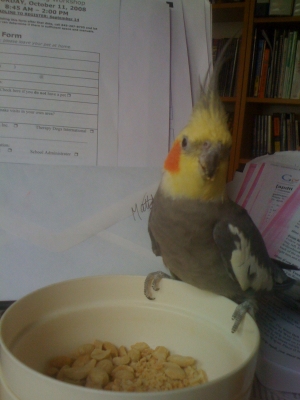Extinction: not just for dinosaurs and 8-tracks

We have three birds here at Dog Spelled Forward World Headquarters. Spike and Angel are a pair of cockatiels and Xander (who should be named Anya, but she was very young when she was found "stray" near our home) is a parakeet.
Angel is "my" bird. (Those of you who have shared children or pets with a significant other are undoubtedly familiar with the concept of "ours" and "yours." For example, "our" son finished near the top of his class and got a full scholarship to college, while "my" son did about $4500 in damage to the Prius last winter.) Angel would start screaming as soon as someone's feet hit the floor in the morning and would continue the racket until the cage was uncovered. When asked, I would simply say "ignore him and don't go near the cage until he stops." My wife would make half-hearted attempts, but it never worked.
Finally one day I put my foot down. He screamed until 11:00 AM. The next day: nothing. A few days later, just as I predicted, it started again. He screamed until 9:00AM. Since then, no screaming.
In the "natural" world, where there are no bowls of pellets or 40 pound bags of kibble, organisms are mostly preoccupied with acquiring food, avoiding becoming food, and er, reproductive activities. If an organism engages in ineffective behavior, (s)he either starves, gets eaten, or is removed from the gene pool.
Operant conditioning describes how effective behaviors are maintained and strengthened and how ineffective behaviors are weeded out. Effective behaviors are reinforced, ineffective behaviors are either punished or not reinforced. Out there in the "natural" world not reinforced is usually a pretty big deal - an animal that exerts too much energy doing things that don't result in getting something back runs the risk of starvation. Everybody has to be Prius out there in the wild.
"Extinction" (in a behavioral context) refers to when a behavior stops because it is no longer being reinforced. Angel screamed because he thought it lead to getting attention. When he screamed and the attention did not arrive after several hours, he stopped. The screaming was actually very expensive in terms of energy and he had to stop. After the attention showed up a while later, he lost the association between screaming and attention.
In dog training (I had to get around to it eventually, didn't I?) we often try ignoring behaviors we don't want. Two of the big ones are barking and jumping up. The sad fact is, waiting for extinction frequently seems to fail with these annoyances. Why is that?
First of all, and this is especially relevant with barking, we frequently miss one or more of the reinforcer(s). If your dog is barking at people walking by the house in an effort to make them go away, and they do always go away, what exactly does your reaction have to do with it?
But the most common reason for failure is not waiting long enough for extinction to occur. Let's consider jumping up on people for greetings. If you want to employ extinction to eliminate this behavior then you must never, ever, ever acknowledge the dog when she is jumping up. The problem is, most families don't do never-ever-ever. They do never-ever-ok-after-school, or never-ever-Aunt-Tillie-likes-dogs, or perhaps never-ever-it's-ok-it's-the-dog-park.
This doesn't just fail. It makes it worse!
One of the more interesting properties of positive reinforcement is what happens to behaviors when you play with how often they are reinforced. A behavior that is reinforced every time ii appears is very strong that is, until you miss one reward: then it disappears. (Think about how long it would take you to go to monster.com if you missed a paycheck for a example.) It turns out, the most durable (resistant to extinction) behaviors are those that are rewarded at random. (Go to the nearest casino and hang out around the slots for an example.) This is why you are told to drop off to rewarding at random after your dog masters a new behavior. It makes it stronger!
So, what do "never-ever-ok-after-school", "never-ever-Aunt-Tillie-likes-dogs", and "never-ever-it's-ok-it's-the-dog-park" look like to you now?
If you reward a behavior that you are trying to extinguish just once you have strengthened it. It's all or nothing with extinction. Wear dirty clothes, get earplugs, send Aunt Tillie on a cruise.
Or, you can try another approach. Train a behavior and/or supply an activity that your dog cannot do at the same time as the annoying one. Barking at people when they walk by the house? Very difficult to do when the blinds are shut and there's a yummy kong nearby. Jumping up? Impossible when you are sitting. (David Letterdog has a whole list of things a dog can't do while sitting.) Another alternative to jumping is to train "Say Hi," which teaches your dog to touch someone's hand with her nose for a greeting. Any of these solutions, combined with ignoring the behavior, can be more effective than just attemptng extinction.
The third pitfall is "spontaneous recovery." Often, previously extinct behaviors will suddenly return. This isn't a failure, it's part of the process. When they do recover, you have to be prepared to ignore them all over again. I expected this with Angel, and we were ready to deal with it. (Although it did happen much more quickly than I expected.)
Extinction is a very important mechanism to understand and can be very useful, but it's important to understand the whole picture before using it, and adding in an behavior that is incompatible with the undesired one is frequently the best approach.




